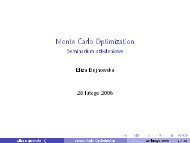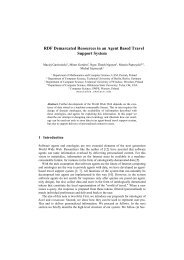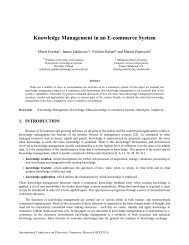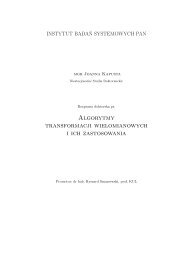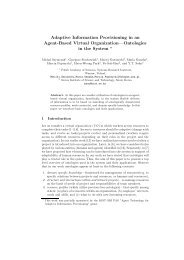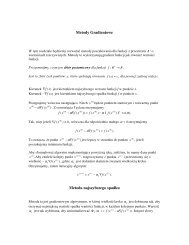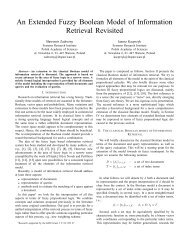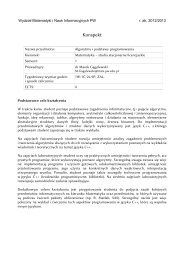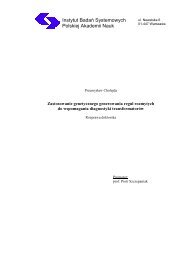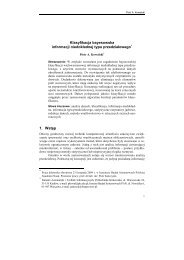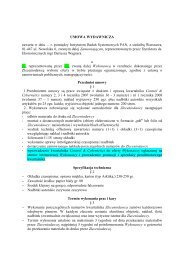Combining Information from Multiple Internet Sources
Combining Information from Multiple Internet Sources
Combining Information from Multiple Internet Sources
Create successful ePaper yourself
Turn your PDF publications into a flip-book with our unique Google optimized e-Paper software.
In this game components are as follows: players are agents, possible moves are change or<br />
keep the URL; payoffs for those moves are defined as a 2x2 matrix. Each agent is assigned two<br />
values: one for the keeping the aforementioned URL and one for changing the selected URL. Those<br />
values may or may not change each round of the game, depending on the previous round outcome.<br />
At the beginning of the process, the results obtained by Manager Agent <strong>from</strong> Search Agents<br />
are filtered, ranked and updated according to the algorithm <strong>from</strong> section 3.4.1. The URL ranking<br />
represents how the agents are confident about a certain URL. From this point the game starts.<br />
The game proceeds as follows. In each round there are two agents selected. Those two<br />
agents are those, which were assigned the result set with the highest ranked URLs. The highest<br />
ranked URL is found as follows: if there is an URL which has, for instance, rank equal to 20 and<br />
there are no URLs with higher rank (taking into account all result sets) then this is a highest ranked<br />
URL. After first agent is found we search for the second agent which has the second highest ranked<br />
URL, but this time omitting the result set which is assigned to previously selected agent. Selected<br />
agents present their highest ranked URLs and have two possibilities: either to keep their answer or<br />
to change it. If the keep action has higher value than the change action, the agent will be assigned<br />
the action to keep its URL for the next round. If, however, the agent is assigned the action to change<br />
its URL and the second agent is assigned the action to keep its URL, the latter is considered a<br />
winner of the round and the former is considered to be the loser – it and its result set are discarded<br />
<strong>from</strong> further considerations. Then the next round starts (without the agent, which was removed in<br />
previous round - that implies removing the result set assigned to it) and so on, until there is only one<br />
agent with his assigned URL. After that the game is restarted – every agent takes part in the<br />
negotiation process once more, however the URL that was selected as the winning in previous<br />
negotiation is removed <strong>from</strong> the further consideration <strong>from</strong> all result sets. Negotiation is performed<br />
in the same manner – round by round agents are removed – but this time they play without the URL<br />
that was selected in the previous “big” round. Process of game restarting continues until there are<br />
10 URLs selected. That is; there are 10 “big” rounds; each being a separate negotiation of one URL;<br />
resulting in 10 URLs being selected and ordered.<br />
The following listing presents one “small” round of negotiation process. That is the<br />
negotiation between two agents. This example presents calculations which are performed during<br />
each round of negotiation process, and what the possible outcomes of the algorithm are; when<br />
approaching this particular situation.<br />
22



